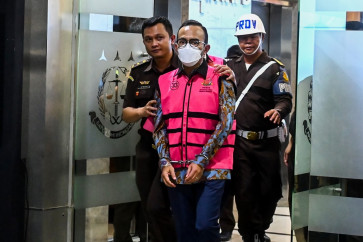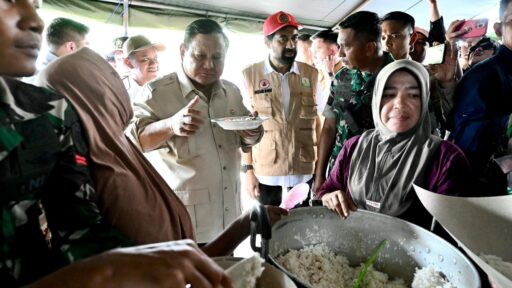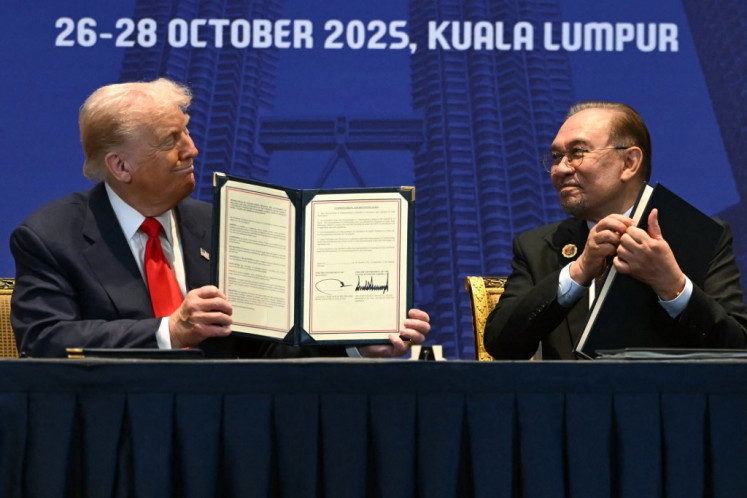Popular Reads
Top Results
Can't find what you're looking for?
View all search resultsPopular Reads
Top Results
Can't find what you're looking for?
View all search resultsPSI, Perindo: Small parties with big dreams
A number of relatively new political parties, including the Indonesian Solidarity Party (PSI) and the United Indonesia Party (Perindo), are standing in the April 17 legislative elections
Change text size
Gift Premium Articles
to Anyone
A number of relatively new political parties, including the Indonesian Solidarity Party (PSI) and the United Indonesia Party (Perindo), are standing in the April 17 legislative elections. Various polls suggest that the newcomers might not meet the parliamentary threshold of 4 percent, but the two parties remain optimistic about their chances.
According to its official website, the PSI has around 700,000 members in Indonesia, mostly from 20 to 30 years of age. The party also requires committee members to be under 45 years old, providing a stage for young people to get involved in politics.
As a coalition party that endorses President Joko “Jokowi” Widodo’s reelection bid, the PSI uses social media campaigns and online recruitment to woo millennials, including their #Merdeka100Persen (100 percent independent) initiative during Independence Day 2015.
Political analysts regard the PSI’s vision of pluralism and anticorruption as effective in attracting young voters, especially those who have little faith in longstanding political parties. It even described the House of Representatives’ spending of lump-sum grants as “legal robbery” in its initiative called “Bersih-Bersih DPR” (Cleaning Up the House of Representatives) held last year.
The party began from a discussion among five figures in 2014 in a café in Jakarta. Included was the former chairman of Muhammadiyah’s Student Association (IPM), Raja Juliani Antoni, and two ex-TV presenters, Grace Natalie and Isyana Bagoes Oka.
In the deliberation, they agreed that almost all institutions, including the police and the Indonesian Military (TNI), had continued reinventing themselves but political parties had been using the same method of putting up politically well-known candidates as their campaign faces since the New Order regime.
“We believe that our new vision of Indonesia could happen where regular citizens could exercise democracy by becoming mayors, governors or even the president,” said Raja, who is now the party’s secretary-general, as quoted by the official website.
The party has set an ambitious target of securing 20 percent of House seats in the 2019 legislative election.
However, with little experience in politics, analysts have criticized the party for adopting conflicting stances with other parties in the coalition, which could backfire in the future.
Last year, when Raja suggested the New Order regime’s corruption cases as one of the topics in the 2019 presidential debate, politicians from Golkar — former president Soeharto’s political vehicle during the New Order—called the action a “blunder” as the party brought “negative energy” into Jokowi’s coalition.
In the same year, PSI chairman Grace Natalie also went the extra mile against religion-based regional bylaws by banning party members from practicing polygamy, which many conservative Muslims and Islamic parties deem as permissible in Islam.
Amid the string of bold moves, the opposition has also confronted the party with its low electability in numerous polls, which ranges from 0.2 to 0.5 percent.
Political analyst Siti Zuhro previously suggested the PSI focus on consolidating its party structure.
“Just trying to appear different will not help much without the necessary grassroots presence.”
Another new party contender in the 2019 legislative election is Perindo, which was founded in 2015 by media mogul Hary Tanoesodibjo, after introducing it as a mass organization two years earlier.
Perindo’s political alliances have waivered from the beginning. The then mass organization supported Prabowo Subianto in the 2014 presidential election, but the party decided to jump ship and has endorsed the incumbent this time around.
The party even filed a judicial review last year to make way for outgoing Vice President Jusuf Kalla to seek a third reelection bid by challenging prevailing legislation. Kalla served his first term as vice president from 2004 to 2009 along with then-president Susilo Bambang Yudhoyono. The court eventually rejected the request.
Hary had also previously been involved in two other parties; the Nasdem Party and the People’s Conscience Party (Hanura) Party.
He joined Nasdem in 2011 but was quick to leave two years later after he fell out with fellow media baron Surya Paloh, who wanted to advance as the party’s chairman at the time.
As he shifted his affiliation to Hanura, Hary was nominated as vice-presidential candidate along with Wiranto, a former military commander and the current coordinating minister for political, legal and security affairs. However, the party failed to garner enough votes in the 2014 legislative election for the pair to advance. Hary quit Hanura in 2014.
In this year’s general election, Hary has said that the party will focus on creating jobs to reduce economic inequality while taking advantage of Indonesia’s demographic dividend, which refers to the high number of working people compared to those of nonproductive age.
“If there are more employers than workers in Indonesia, then salaries will also increase,” Hary said, as quoted by kompas.com.
Polls suggest that the party has gained traction among voters. A 2017 Center for Strategic and International Studies (CSIS) survey revealed that 81 percent of millennials recognized the party, while 70 percent of older age groups claimed to know about it.
Surveys conducted by the CSIS, Lingkaran Survei Indonesia and Kompas between January and March have put Perindo’s electability at 1.1 to 4.7 percent, giving it hope of getting seats in the House if it passes the 4 percent threshold in its first-ever legislative election.
Hary’s party will also have to compete head-to-head against his former party Nasdem, which met with success in the 2014 presidential election after joining forces with Golkar, Surya’s previous political vehicle.










